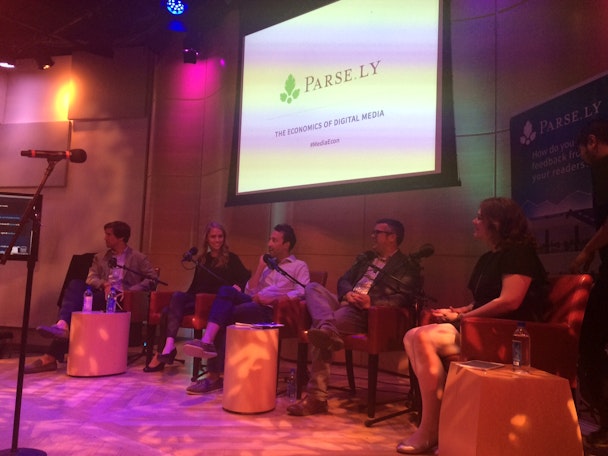How to make money in digital media according to Gawker, Apartment Therapy & Medium
Venture capitalists continue to spend big on new media while more traditional organisations are also investing in digital, however both continue to grapple with day-to day-revenue generation through and around content creation.

Venture capitalists continue to spend big on new media while more traditional organisations are also investing in digital, however both continue to grapple with day-to day-revenue generation through and around content creation.
In July, NBCUniversal invested big in Vox and Buzzfeed, reportedly spending $200m on the latter, leaving digital players worrying their mature competitors enough to make them want to join the online party.
But what options do those media companies not attracting multi-million dollar investment from sugar daddy legacy media have in enlarging their own bank balances?
Advertising is still a major factor in this, however in recent years various other revenue generation options have come into play, not least branded content creation and digital advertising.
"Direct sales is still our bread and butter and how we make money in the future is still going to be based on those direct relationships selling custom integrated packages," states Elise Layton, director of revenue operations for Apartment Therapy in response to the theory that programmatic advertising will usurp all other revenue generating methods.
"I am still really bullish around affiliate because the problem with monetising websites is that readers hate to be marketed to," she adds before describing affiliate marketing as "one of the most seamless ways" for online publishers to monetise their audiences.
"We only make money if a product that we are authentically discussing moves a reader enough to make a purchase as a result," she continues.
Ryan Brown, vice president of business development at Gawker says that its affiliate programme allows the company’s sites to "monetise with discreet and intentional business editorial".
He advocates a partnership mentality of building communities across several sites, something Gawker does across its range of blogs.
Joe Purzycki, head of partnerships at blog publishing platform, Medium agrees and cites examples of successful student college sites that have been able to generate revenue of up to seven figures as a result. "We are missing frictionless opportunities to drive revenue for small people. It's really hard to make money unless you have scale, so communities coming together is prime."
Ad blocking is a major concern that many online publishers are pre-occupied with. The possibility that online ads won't be seen by readers, impacting viewing rates, is a disastrous possibility, however the morality issues raised are also a concern for them to consider.
"I personally have an issue with ad blocking but I don't know what the long-term solution is truthfully," states Purzycki. "You will see more pay-per-play ad blocking opportunities where you take revenue from publishers to unblock their advertising."
Brown adds: "It's time for some real talk about privacy because we know for a fact that data leaks have led to reader data being exposed...we know that we are complicit through this industry to expose our readers to a certain level of privacy. So how can we be more transparent about that and how do we tell people how the system works so they are more aware of it?"
Brown then cites the Guardian's system of asking users to offer financial support through alternative measures as a more transparent revenue strategy, pinpointing Google Contributor as a related tool.
"I think we'll see huge advancements in the next year or so," adds Layton of emerging solutions to the ad blocking issue, echoing the use of Google Contributor. "In some ways it's immoral to show a user the same ad that takes over their screen 14 times and is wretched to look at. It'll be cool to see how it shakes out over the next 12 months but we're not looking at no ad internet in that time."
As for native advertising and the widely emulated strategy by media en mass of creating native content for advertisers, Brown claims that it is an opportunity to tell a story for a client.
"Regardless of the click-through the space is far richer," he says.
Purzycki claims that the important element for his company to keep in mind is what happens after readers click through to a piece of native content. He adds that they place more credence of the metric of 'Total Time Read' for each story rather than visit rates in order to offer engagement. This could be a solution for mobile engagement metrics too, he concedes, although advertisers continue to ask about site visits and comments as well.
Brown describes the experience of Integrating Facebook comments onto sites as "abysmal" before admitting that while they are there to be kicked by publishers it is still very important as an audience driver.
Discussing mobile, Purzycki concedes that the current strategy of repurposing desktop experiences down to suit a mobile screen is "probably not the best experience, but there is a tonne of engagement behind it...think about mobile first experiences."
There are three things that set mobile apart he adds; location data, user generated content and community building.
"People want dedicated experiences. They want an app to experience their communities which in doing can probably circumvent ad blocking to some extent," adds Brown.
The thoughts on media revenue generation emanated from a panel assembled by analytics firm Parse.ly and moderated by Yahoo's head of audience development, Alex Leo. They discussed their views on how digital news organisations could generate money and the many challenges that they face.

